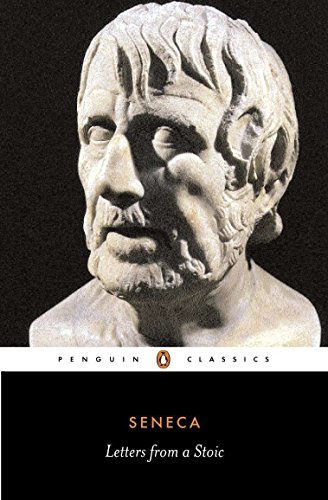

Full description not available
N**
Incredibly enjoyable
This book is a gem .Every letter that a strong message .Friendship, illness, slavery ,power, monet and so many aspects are covered. Seneca was a controversial character yet his wisdom is so pragmatic. Only thing I didn't like is portraying women weak in few of his letters .Rest a must read for lifetime
W**R
Seneca Our Contemporary
It’s not often you read a classical author and feel you are reading one of your contemporaries. But this is the case with Seneca in these letters which he wrote to a friend in the early 60s AD. They are affable, witty, and supremely accessible. Perhaps the most striking thing about them is their materialist discourse at a time when religious explanations were widespread. For Seneca the universe consisted of matter informed by creative reason, the same reason that informs the human personality. Hence the Stoic assertion that god is within us, and that a virtuous life lived according to reason could achieve tranquillity, the state of being of the gods, if there are any. Ethics was accordingly the centre of philosophy for the Stoics, with their basic concepts of moderation, acceptance, and endurance. And the letters are filled with practical advice on how to live a virtuous and happy life, much of which seems eminently sensible today. There’s his advice, for example, on how to cope with the Saturnalia, the Roman festival later transformed into Christmas: don’t overindulge, but don’t opt out either. Stoicism, however, was the ideology of the ruling class, and it has the limitations of the class it derives from: self-direction, social and political conservatism, indifference to the plight of others. Its historical significance lies in becoming the personal ethic of Christianity, supplemented by the New Testament ethic of neighbourly love, after the adoption of Christianity by the Roman empire in the fourth century. An instructive and enlightening collection rendered in a sympathetic and unobtrusive translation.
R**A
Profound knowledge
This is my first book review. I don't know much about how to classify a book, but I am impressed about the deep applicable knowledge shared in this book. Remarkably profound and sometimes touching. I love it. It should not be read too fast, instead, digested page by page.It was the first philosophy book I read in a second language. I found it pleasant since Seneca often repeats the same idea more than once in order to improve comprehension. Very proficient people could maybe find it annoying, nevertheless, it was perfect for me.
A**N
Am I Missing Something?
32 number of pages are missing! Page#65 to 96. Penguin is THE leading publishing house in the world. This edition is printed in India (at Thomson Press, New Delhi, no less. A renowned printing establishment themselves). No wonder. This is not the first time I've encountered some mishaps in a Penguin book which is manufactured in India. I'm not being sceptical, but surely something strange is happening with the book production industry in our country, even if the book is from a famed publisher such as Penguin. You tell me guys. Aren't the Penguin India (a part of Penguin Group worldwide) books oddly underwhelming (qualitywise) than the same title but printed elsewhere? What am I missing here?(Though this is perhaps not the ideal expression of emotion from someone who is trying to read a book written by a stoic philosopher, right? But remember, i couldn't able to finish the book.)
D**D
Bad edition, awful print, stoically reject
The edition sold here by Penguin Books India needs to be withdrawn from circulation. The type size varies from small to miniscule and often makes the writing illegible. The book is carelessly printed on the cheapest of papers by a careless printer which causes the ink to dab on the paper like that on a cheap handbill or fading photocopy. The paper itself is yellowish, soggy, and worse than cheap newsprint; at its best, the book wouldn't last for more than five years._Regarding the edition:_ Robin Campbell (the translator) randomly selects 40 out of Seneca's 124 letters to Lucilius. Often, he clips his selected letters according to his strange criterion of "personal" choice. His translation is stiff and formal, and reads like the neighing of a tired and extremely bored horse trying to drag Nero's carriage than the voice of the relaxed Stoic thinker that Seneca was (or pretended to be).If you are looking forward to read Seneca's Epistles in full, look for the 2015 University of Chicago Press translation by Margaret Graver and A. A. Long--called "Letters on Ethics".Or try the 1917–1925 translation by Richard M. Gummere (originally published by Harvard University Press, and partially available through the Dover Thrift Edition "Letters from a Stoic"). If these cause a severe pocket pinch, look for public domain translations freely available on kindle or the internet which, despite their archaic phrasings, would serve you better.But stoically reject this Penguin Classics edition (and Penguin classics Indian editions in general).Seneca's ghost would salute you._Vale_
M**N
Surprisingly easy read
As someone interested in stoicism I felt it paled in comparison to the Discourses by Epictetus (or the Enchiridion - a shorter book by the same author). But its a much, much easier read, probably the easiest to get into of the classics I've read so far - surprisingly easy actually, it doesn't feel like an ancient book. Its still has some very useful ideas and some of the things he mentions in passing are quite fascinating as they give small glimpses into the society he lived in. I'd recommend it but I'd strongly urge anyone interested in Stoicism to also read Epictetus works.
Trustpilot
2 weeks ago
3 days ago